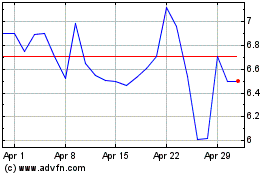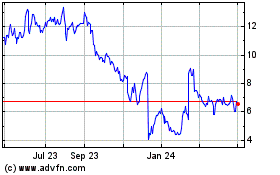Cogent Biosciences, Inc. (Nasdaq: COGT), a biotechnology
company focused on developing precision therapies for genetically
defined diseases, today announced positive lead-in data from its
ongoing Phase 3 PEAK trial evaluating the selective KIT D816V
inhibitor bezuclastinib in patients with Gastrointestinal Stromal
Tumors (GIST). The data are being presented today in a poster
presentation at the American Society of Clinical Oncology (ASCO)
Annual Meeting in Chicago, IL.
“The results presented today from the lead-in portion of the
PEAK study are very encouraging, as the data continue to show that
the combination of bezuclastinib and sunitinib has impressive
clinical activity in highly refractory GIST patients and is
well-tolerated,” said Andrew Wagner, M.D., Ph.D., Senior Physician,
Center for Sarcoma and Bone Oncology, Dana-Farber Cancer Institute,
and Associate Professor of Medicine, Harvard Medical School. “These
data reinforce the importance of the ongoing Phase 3 PEAK clinical
trial, which has the potential to bring a new standard of care to
imatinib-resistant GIST patients.”
“These data reinforce our belief that the combination of
bezuclastinib and sunitinib has the potential to become a new
treatment option for second-line GIST patients,” said Andrew
Robbins, President, and Chief Executive Officer at Cogent
Biosciences. “We are pleased to demonstrate in a robust clinical
dataset that the addition of bezuclastinib to sunitinib does not
appear to change the frequency or severity of adverse events
associated with sunitinib monotherapy. In addition, we are
encouraged by the performance of this combination in second-line
GIST patients, the population we are currently enrolling in the
Phase 3 PEAK clinical trial, with a disease control rate of 100%
and 4 out of 7 patients now on treatment for more than 10
cycles.”
PEAK Study DesignThe PEAK study is a
randomized, open-label, global, Phase 3 clinical trial evaluating
bezuclastinib in combination with sunitinib in GIST patients
previously treated with imatinib. As of the data cutoff date of
March 29, 2023, 39 patients had been treated in Part 1, with 19
patients in Part 1a and 20 patients in Part 1b. Seven patients had
received only imatinib as prior therapy, and 32 patients had
received at least 2 prior tyrosine kinase inhibitor (TKI)
therapies.
Safety Data As of the cutoff date of March
29, 2023, the combination of bezuclastinib and sunitinib was
generally well-tolerated with an encouraging safety profile. The
majority of treatment-emergent adverse events (TEAEs) were
low-grade and reversible, with a low rate of Grade 3 or higher
events observed. 23% of patients experienced dose reductions of
either medication, and only two patients discontinued treatment due
to adverse events. Across Part 1a and Part 1b, there were only two
patients with serious adverse events reported that were possibly
associated with either study medication including one patient with
grade 2 neutrophil count decrease and pyrexia and grade 3 platelet
count decrease and one patient with grade 2 bacterial peritonitis
and grade 3 febrile neutropenia. Overall, the safety and
tolerability profile of the combination appears consistent with
that of single-agent sunitinib, suggesting that bezuclastinib is
not adding to the overall frequency or severity of adverse events
associated with single-agent sunitinib.
Clinical Activity Data As of the cutoff
date, 39 patients had been treated for at least one 28-day cycle,
with a range of 1-13 cycles, and 25 of the 39 patients continue to
receive treatment. Data were immature to estimate median
progression free survival. Across the efficacy evaluable patients
in Part 1, the disease control rate (CR + PR + durable SD) is
currently 55%; including a 100% disease control rate and 17% ORR
among the efficacy evaluable 2nd-line patients in Part 1a. Across
the study, 21 patients have demonstrated radiographic evidence of
reduction in target lesion diameter, including 4 patients who have
achieved partial response. Among those responders the time to first
response was as long as 8 cycles, suggesting that patients
currently early in treatment may achieve responses over time.
As of June 1, 2023 four of the seven 2nd-line patients in Part
1a remain on study with at least 10 cycles of therapy.
Bezuclastinib Clinical Development Cogent
is actively enrolling patients in Part 2 of the Phase 3
registration-enabling PEAK trial, which is expected to include
approximately 388 second-line, post imatinib GIST patients.
Additionally, Cogent remains on track to present initial clinical
data from SUMMIT, a randomized, double-blind, placebo-controlled,
global, multicenter, Phase 2 trial of bezuclastinib in patients
with nonadvanced systemic mastocytosis in the second half of 2023.
Data will include safety/tolerability, pharmacokinetics, and
measures of clinical activity. The Company also expects to present
clinical data from approximately 30 patients in Part 1 of the Phase
2 APEX trial in patients with advanced systemic mastocytosis at a
scientific meeting in the second half of 2023.
Webcast Information and ASCO Poster Cogent
will host a webcast on Monday, June 5, 2023 at 8:00 a.m. ET (7:00
a.m. CT) to discuss today’s update, with participation from Andrew
Wagner, M.D., Ph.D., Senior Physician, Center for Sarcoma and Bone
Oncology, Dana-Farber Cancer Institute, and Associate Professor of
Medicine, Harvard Medical School. The live event can be accessed on
the Investor page of Cogent’s website at investors.cogentbio.com. A
replay of the webcast will be available approximately two hours
after the completion of the event and will be archived for up to 30
days.
The ASCO poster is available to registered conference attendees
and is also in the Posters and Publications section of Cogent’s
website at www.cogentbio.com/research.
About Cogent Biosciences, Inc. Cogent
Biosciences is a biotechnology company focused on developing
precision therapies for genetically defined diseases. The most
advanced clinical program, bezuclastinib, is a selective tyrosine
kinase inhibitor that is designed to potently inhibit the KIT D816V
mutation as well as other mutations in KIT exon 17. KIT D816V is
responsible for driving systemic mastocytosis, a serious disease
caused by unchecked proliferation of mast cells. Exon 17 mutations
are also found in patients with advanced gastrointestinal stromal
tumors (GIST), a type of cancer with strong dependence on oncogenic
KIT signaling. In addition to bezuclastinib, the Cogent Research
Team is developing a portfolio of novel targeted therapies to help
patients fighting serious, genetically driven diseases initially
targeting FGFR2 and ErbB2. Cogent Biosciences is based in Waltham,
MA and Boulder, CO. Visit our website for more information at
www.cogentbio.com. Follow Cogent Biosciences on social media:
Twitter and LinkedIn. Information that may be important to
investors will be routinely posted on our website and
Twitter.
Forward Looking StatementsThis press release
contains forward-looking statements within the meaning of the
Private Securities Litigation Reform Act of 1995, including, but
not limited to, statements regarding the potential for
bezuclastinib to bring a new standard of care to imatinib-resistant
GIST patients, the anticipated size of the company’s Phase 3 PEAK
trial, the company’s plan to present initial clinical data from
SUMMIT in the second half of 2023, and the company’s plan to
present clinical data from Part 1 of the APEX trial at a scientific
meeting in the second half of 2023. The use of words such as, but
not limited to, "anticipate," "believe," "continue," "could,"
"estimate," "expect," "intend," "may," "might," "plan,"
"potential," "predict," "project," "should," "target," "will," or
"would" and similar words expressions are intended to identify
forward-looking statements. Forward-looking statements are neither
historical facts nor assurances of future performance. Instead,
they are based on our current beliefs, expectations and assumptions
regarding the future of our business, future plans and strategies,
our clinical results, the rate of enrollment in our clinical trials
and other future conditions. New risks and uncertainties may emerge
from time to time, and it is not possible to predict all risks and
uncertainties. No representations or warranties (expressed or
implied) are made about the accuracy of any such forward-looking
statements. We may not actually achieve the forecasts or milestones
disclosed in our forward-looking statements, and you should not
place undue reliance on our forward-looking statements. Such
forward-looking statements are subject to a number of material
risks and uncertainties including but not limited to those set
forth under the caption "Risk Factors" in Cogent's most recent
Quarterly Report on Form 10-Q filed with the SEC. Any
forward-looking statement speaks only as of the date on which it
was made. Neither we, nor our affiliates, advisors or
representatives, undertake any obligation to publicly update or
revise any forward-looking statement, whether as result of new
information, future events or otherwise, except as required by law.
These forward-looking statements should not be relied upon as
representing our views as of any date subsequent to the date
hereof.
Contact:Christi WaarichSenior Director,
Investor Relationschristi.waarich@cogentbio.com617-830-1653
Cogent Biosciences (NASDAQ:COGT)
Historical Stock Chart
From Nov 2024 to Dec 2024

Cogent Biosciences (NASDAQ:COGT)
Historical Stock Chart
From Dec 2023 to Dec 2024
